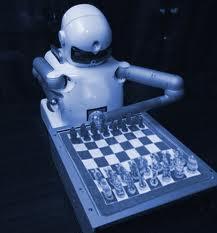The first two parts of this article generated many comments from our readers so let me address a couple of popular misconceptions.
First of all, the goal of this article is not to find out who plays chess better, computers or human players. This question was definitely answered years ago and the difference in the playing strength will be getting bigger and bigger as the computers become faster and their programs get more sophisticated. So when I analyzed the game where Nakamura managed to take advantage of the 'horizon effect' and beat the silicon beast, it was a good example of human being smarter than a computer, not stronger. (Of course this statement doesn't even need a proof since computers and their programs are created by humans and strictly speaking computer is just a piece of metal that executes human commands quickly and without mistakes). So to me Nakamura's game is a celebration of the human mind.
The following point is more important in my opinion. Chess.com is a very nice virtual place where people from all over the world can share their views and ideas about our beautiful game. And my article is just that - my personal opinion. So, before you write in your comment that being a Grandmaster for over 20 years doesn't make me an expert in computer chess, please remember that I never claimed that my article is the ultimate truth about computer chess. It is just my personal view based on my personal experience.
After above mentioned disclaimers, let's focus on our subject. Many chess players use chess engines as their guides. Indeed it is very convenient to ask Houdini or Fritz why Anand played that move and why his opponent didn't capture a pawn for free. But remember, this approach has its limitations. If the position is sharp and it is all about calculations there, then your chess engine is as close to the ultimate truth as it is possible. But if the position is relatively quiet, then the computer's suggestions could be misleading. Here is a simple example:
I call this position "Capablanca's position" because I saw a similar position many years ago in one of Capablanca's books. What's the evaluation of this position? Capablanca claimed that White is strategically winning due to his superior pawn structure. I am sure that most of the modern GMs would share the opinion of the great Cuban. Meanwhile many computer engines think that White has a significant but not a winning advantage. Here we again see sort of 'horizon effect'. Capablanca knows that in the long run a weak backward c6 pawn and a strong , potentially passed e5 pawn should bring White a win, meanwhile a chess engine cannot see that far (White will probably need 20-30 moves to convert his advantage into a win). The next game of Capablanca is a good example of this concept. Please note that in his game Capablanca's e5 pawn wasn't potentially passed pawn and Black's c6 pawn wasn't backward or weak, and yet he was able to slowly grind down his opponent.
In the position after Kramnik's move 18. f4! I was about to resign and the reader asked why. According to a chess engine White's advantage wasn't that big (less than +.5)
I wasn't afraid of Kramnik (we played five games and this game was my only loss) but I simply didn't see how to stop his coming attack on the King's Side while I had no counter play whatsoever. Therefore, in my opinion, the computer's evaluation is totally wrong. It simply doesn't see the coming attack due to the same 'horizon effect'.
Finally, let me show you my game vs. Nakamura. But please don't ask me what was going on between moves 17 and 25. I am planning to discuss it in one of my future articles. The game reached the position on the diagram and there is only one move that saves White:
I was told that when I played my only saving move, many spectators who watched the game live on the ICC screamed that Serper had lost his mind because their chess engines showed evaluation of -4 or even more. Of course as I mentioned in the first part of this article, the computers simply don't understand the concept of a fortress and therefore they wouldn't be able to save the game. So, whenever you use your trusted engine for chess explorations, please remember that computers are a wonderful learning tool, but they have their own limitations!
to be continued...







